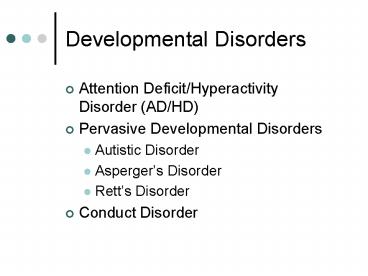Developmental Disorders - PowerPoint PPT Presentation
1 / 15
Title:
Developmental Disorders
Description:
Developmental Disorders. Attention Deficit/Hyperactivity Disorder (AD/HD) ... Echolalia) lack of imaginative play. Symptoms (cont. ... – PowerPoint PPT presentation
Number of Views:59
Avg rating:3.0/5.0
Title: Developmental Disorders
1
Developmental Disorders
- Attention Deficit/Hyperactivity Disorder (AD/HD)
- Pervasive Developmental Disorders
- Autistic Disorder
- Aspergers Disorder
- Retts Disorder
- Conduct Disorder
2
AD/HD
- Characterized by impulsivity, inattention, and
hyperactivity that are inappropriate to their
developmental levels. - 3-7 of school age children
- often continues into adolescence and adulthood
- 2 to 9 times more common in males than females
3
Diagnostic Criteria
- must begin by age of 7
- must cause significantly impaired academic or
social functioning - must present at least 6 symptoms of either
inattention or hyperactivity (listed below) - symptoms must last at least 6 months
- symptoms must be present in at least 2 settings
4
Inattention symptoms
- fails to attend to details or makes careless
errors in schoolwork - difficulty sustaining attention in schoolwork or
play - does not listen when spoken to directly
- does not follow through on instruction or
complete tasks - difficulty organizing tasks or activities
- loses things
- easily distracted
- forgetful
5
Hyperactivity-Impulsivity symptoms
- fidgets and squirms
- leaves seat in classroom
- runs about or climbs excessively in inappropriate
situations - difficulty playing quietly
- is often on the go with motor running
- talks excessively
- blurts out answers
- difficulty awaiting turn
- interrupts
6
Treatment
- Medication
- Ritalin or Adderall stimulants
- Concerta a time released stimulant
- Straterra a neuromodulator
- Cognitive-Behavioral Therapies
- focus on organizational strategies
7
Pervasive Developmental Disorders
- Severe and pervasive impairment in several
developmental areas - Social Interaction
- communication
- Presence of stereotyped behavior, interests,
activities.
8
Autistic Disorder (Autism)
- Abnormal or impaired development of social
interaction and communication - Restricted repertoire of activity and interests
- First identified by Leo Kanner in 1940s
- 4-5 times more common in boys than girls
- Most autistic children have some form of mental
retardation
9
Symptoms
- Impaired Social Interaction
- impaired nonverbal behaviors (eye contact, facial
expression, body postures, gestures) - failure to develop peer relations
- lack of social and emotional reciprocity (give
and take)
10
Symptoms (cont.)
- Impaired Communication
- delay in, or total lack of, speech
- inability to sustain conversation when speech
ability is present - speech abnormalities (eg. Echolalia)
- lack of imaginative play
11
Symptoms (cont.)
- Restricted, Repetitive, and Stereotyped behavior
- restricted range of interests
- insistence on routines and sameness
- stereotyped movements (rocking, head banging,
etc.) - preoccupation with mechanical objects
- Symptoms must be present by age of 3
12
Causes
- First thought to be caused by detached parenting
style - faulty assumption
- Brain abnormality exact nature is unknown
- Genetic trigger
- Prenatal complication
- MMP Immunization reaction?
- New research says no but doubts remain
13
Retts Disorder
- Only diagnosed in females
- Slowed head growth
- Loss of hand skills
- Impaired language and motor skills
14
Aspergers Disorder
- Differs from Autism in that early language and
cognitive skills are not significantly delayed.
15
Conduct Disorder
- Persistent pattern of violating rights of others
and societal norms - Aggression to people and animals
- Destruction of property
- Deceitfulness or theft
- Serious violation of rules
- Often leads to Antisocial Personality Disorder in
adults

